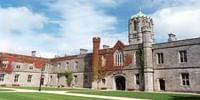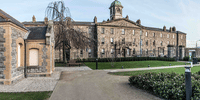?It includes the study of how individual organisms interact in communities and how communities interact with the surrounding ecosystem.
This degree addresses such questions as: what controls animal and plant distribution, abundance and biodiversity? How do energy and nutrients move around ecosystems? How do species interact with each other? It also examines the biology of various habitats from marine and freshwater to terrestrial habitats and the soil. It uses the understanding of basic ecological principles and concepts to predict and manage environmental change caused by the human impact on natural ecosystems.
It includes subjects such as:
- Conservation
- Pest Control
- Wildlife and Fisheries Management
- Pollution and Ecotoxicology
- Resource Management
Field courses form an important part of this course. You will visit a variety of sites in West Cork in Year 2, go to Portugal in Year 3, and choose between the Burren, Co Clare, or Millport Island, Scotland, in Year 4.
Assessment
Written exams will take place before Christmas and in May. Not all modules will have formal examinations. Many modules use other types of assessment including essays, assessed practical exercises, field reports, multiple-choice questionnaires, assessed presentations and project work. The range of assessments provides a broad base of skills relevant to future employment.











